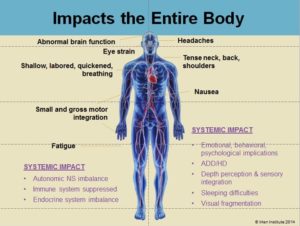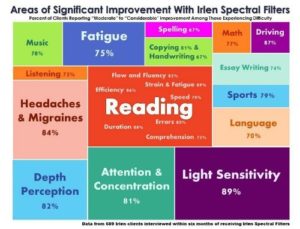Keep reading for the facts and helpful remedies!
Did you know 5-18 year-olds can spend 6-8 hours staring at electronic screens every day, adding up to 3 months out of every year?
Do you realize that the average person touches, swipes or clicks their phone 2,617 times a day? The top 10% of phone users do so a whopping 5,427 times a day. Is screen time taking a toll on your health? The answer is simple—yes.
How Screen Time Could Be Hurting Your Child’s Developing Brain
A recent study conducted by the National Institutes of Health surveyed the impact of screen time on 4,500 children ages 8-11. These researchers examined the amount of time spent looking at screens, sleeping, and engagement in physical activity and compared those times to the guidelines of the Canadian Society for Exercise Physiology. Children who met the requirements of those guidelines, including 8-11 hours of sleep, 1 or more hours of physical activity and under 2 hours looking at screens, had better brain function, sleep, alertness, memory, as well as less anxiety and depression. Only 1 in 20 kids in the United States meet all 3 guidelines, and almost 1 in 3 met none of them.

The Negative Effects of Screen Time
A growing number of children and adults are dealing with sensory overload, a lack of restorative sleep and a hyperaroused nervous system. To put it plainly, too much screen time over an extended period of time can permanently affect your ability to sit still and concentrate. Those issues can follow a child into adulthood, manifesting in problems learning, working, relationships and managing stress. Use of drugs and alcohol to address problems can lead to harmful, disabling addictions and stress related health problems.
In very young children, permanent damage can occur to developing brains. Between birth and age 3, brains develop rapidly and are sensitive to the surrounding environment. In order for neural pathways to develop properly, kids need movement, natural light and outdoor play, as well as human interaction, including games and socialization. Overloading the brain with excessive stimuli, including visually stressful screen-time, while getting less movement and time to recharge and relax can affect the entire body and cause learning and attention problems as well as poor ability to manage everyday stressors. Problems with vision and auditory processing, reading, math, test taking, handwriting, sustained attention, problem solving, and chronic headaches and migraines are increasing, as well as numbers of people diagnosed with depression, anxiety, Asperger’s Syndrome and Autism.
The Negative Effects of Computers and Tablets on Learning
While many classrooms are investing in laptops, tablets, whiteboards, and computer distance learning, they are beginning to result in unintended consequences. One major study earlier this year found that giving students greater access to tablets, laptops and e-books in the classroom was correlated with significantly lower educational performance and higher rates of attention deficits and behavior problems.

Over exposure to blue light emitted from electronic devices can harm can harm a person at any age, but especially children. Blue light is close to ultraviolet light on the spectrum, which means that it can harm delicate structures of the eye and brain. Specially formulated Rx or PLANO colored lenses that filter out adverse spectral bands of light frequencies, including blue light, are a highly effective way to reduce that negative impact, improve function immediately and allow the body to repair damaged cells and structures as well as minimize increased damage with long term exposure to more than just blue light . Fluorescent lighting, high contrast patterns and bright lights can also add to the stress and Spectral Filters can help under adverse conditions .
THESE ARE NOT SUNGLASSES OR OPTICAL TINTS PROVIDED BY TRADITIONAL EYE GLASS STORES AND EYE DOCTORS. There are only two specialized Optical labs in the world that can tint glasses for this remediation which is immediate, long term with yearly monitoring and sometimes adjustments, and must be evaluated by a specially trained Irlen Diagnostician usually working as a team with an eye doctor, as needed. Often vision therapy, support services (OT, SLP, PT, and Tutoring) can be minimized – saving much time and $$.

How to Protect Your Family from the Negative Effects of Blue Light and Electronic Device Overload, or Computer Syndrome and Screen Anxiety – New Terms are Emerging as Problems are Studied and Defined.
- Wear specially formulated Irlen lenses that filter out adverse spectral bands of light, including blue light whenever you’re using technology, working under bright, artificial or fluorescent lighting, or blue lights. Some blue-blocking lenses can remove up to 100% of the adverse blue light.
- Avoid high contrast patterns on walls, furniture, clothes, and floors. De-clutter to minimize distractions.
- Use dimmers and zoned lighting fixtures to regulate brightness and room lighting levels to improve comfort and decrease fatigue while working.
- Turn off technology 2 hours before bedtime. Blue light disrupts your circadian rhythm and makes it harder to sleep.
- Avoid using devices in complete darkness, as this increases eye strain due to contrasting lighting and visual stress.
- Turn down the brightness on the devices that you use.There are a number of apps that are designed to decrease the blue light emitted by devices, so you can also explore what they have to offer.
- Change the screen background color to one that provides comfort and greater clarity. APPLE devices have a color tint background setting under SETTINGS, BACKGROUND APPEARANCE, ACCOMMODATIONS, and COLOR DISPLAY. www.irlen.com has an app for androids. Color overlays and clings can also be placed over books and computer screens. Changes are immediately beneficial!!!
Dr. Jack Kruse On Biohacking Your Water, EMFs, Blue Light, DHA, Cold, Sun and Sleep
Contact Us Today
To learn more about our irlen Screenings and Diagnostic, accessibility consultations and injury prevention services, call us today at (410) 358-7269.To get started at home, complete a pre-assessment for Sensory Processing Disorder, schedule a free phone consultation, and learn more about the Irlen screening process, Irlen diagnostic testing, Irlen re-tint testing, and see who we help for a view of issue that can be remedied.


